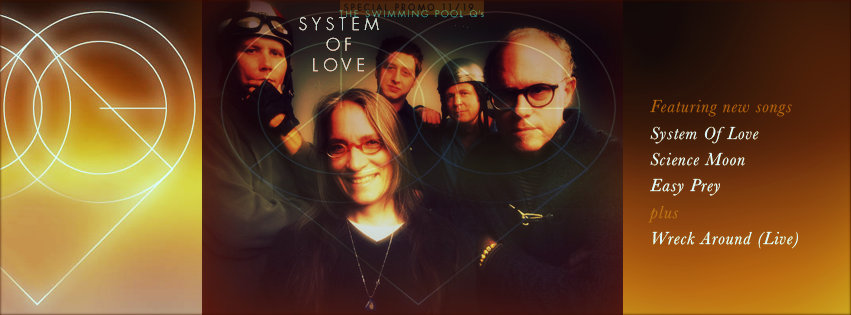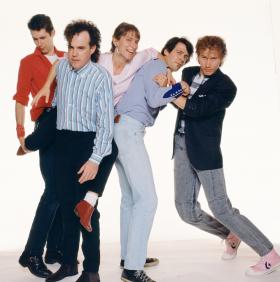System of Love EP by The Swimming Pool Q's- MP3 Album
The Swimming Pool Q's A&M Years Resurface
Two long-lost albums from a not-so-long-lost Atlanta band are being “found” today. The Swimming Pool Q’s are celebrating their 35th anniversary as a band with the release of 1984-1986: The A&M Years, which collects their two out-of-print major label albums. WABE’s Myke Johns spoke with members of the group and has this.
The Swimming Pool Q’s formed in June of 1978. At the time, Punk and new wave were the emergent trends and the Q’s own brand of literate, angular, and lush guitar-driven rock got them the attention of audiences and record labels alike.
Jeff Calder is the group’s guitarist, singer, and primary songwriter. He recalls the Atlanta music scene back then to be big enough to be exciting.
“But it was small enough to where…you know, within six or eight months of being a group, we were opening for Devo, the Police. All those years of touring the South in the late ’70 and early ‘80s, that’s how we found ourselves.”
And they found themselves in good company. The early ‘80s in Georgia was home to musical luminaries like Pylon, the Hampton Grease Band, the B-52s, and REM.
“We played with so many groups passing through’” Calder says. “Atlanta being a big town, it was one of the major stops on what was emerging as a kind of new wave and punk circuit. We’d play the Great Southeast Music Hall, The Agora, 688…”
Outside of Atlanta, the Q’s kept up a rigorous touring schedule. And with a van-full of musicians and musical equipment… not to mention some pretty good tunes, the Q’s were set to make their mark. In 1983, the band got signed to A&M Records—a major label and home to Frank Zappa and the Beach Boys.
“Well at the time, I think we were really excited,” says Anne Richmond Boston, the Q’s singer and keyboardist. “That was the next step. If you wanted to get your songs out there and music out there, you had to be on a major label back then.”
The result was 1984’s album The Swimming Pool Q’s. The album won critical acclaim and the band toured with Lou Reed throughout the US and Canada.
But despite their success, the band still could not seem to crack commercial rock radio. And without radio play, album sales were slow. A&M released the band’s third album,Blue Tomorrow in March of 1986. And the label gave them much less support than the previous album—little radio promotion, no music videos, no high-profile tour.
When the band’s two year-contract was up, they were quietly shuffled off A&M’s roster.
So the Swimming Pool Q’s returned to the life of an indie band, releasing a couple more albums in the years since. Their major-label albums went out of print and as they did, Calder diligently set about trying to get them re-released.
“It was hard to find the right people. And whenever I’d find the right person, we’d move the project along, and then they would vanish. The music business [is] always shaky, but in the last 10 years…particularly unstable.”
Part of the wild goose chase was due to A&M being sold to Universal . When Calder finally made contact with the right people, he discovered that he could have the Q’s two major label albums…for $15,000. The band started a campaign on the fundraising site Kickstarter, stood back and crossed their fingers, and…the fans responded. In the end, the band came in $6,500 over their goal.
Calder recalls how great it felt to write Universal a check.
“And it was done, it was that simple.”
Boston found the fan response touching. But this is a perfect example of how the music industry has changed since the 1980s. Where lack of radio-play and major label support once sunk these albums, The Swimming Pool Q’s have brought them back to life entirely independent of both of those entities. That “instability” in the music industry that Calder cited may just be the balance of power realigning from the recording industry to the artists and fans—the folks who are emotionally invested in these albums which until recently were just a pair of assets on Universal’s spreadsheet.
Talking about this at a few decade’s remove, the Q’s are in a much different place now than they were at the time these albums originally came out. Anne Richmond Boston says that with a lifetime of experience now under her belt, “even the physical act of singing is much more cathartic now.”
The Swimming Pool Q’s collection “The A&M Years” is available now. For more information, visit the Q's website.
Listen: The Swimming Pool Q's perform "The Bells Ring" in the WABE's studios.






